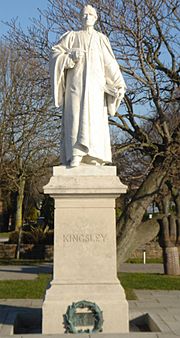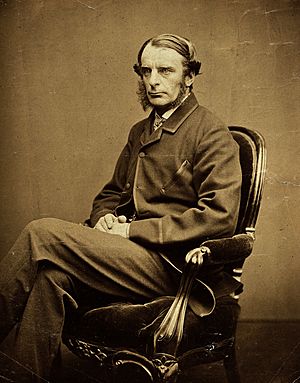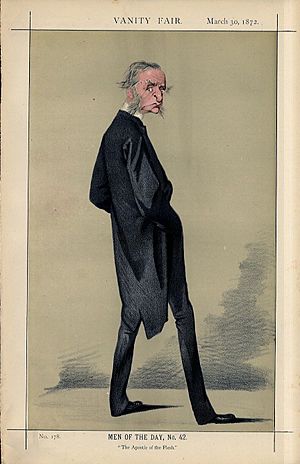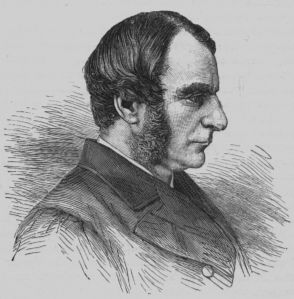Charles Kingsley facts for kids
Charles Kingsley (born June 12, 1819 – died January 23, 1875) was an English writer, priest, and professor. He was also a social reformer who cared deeply about improving the lives of working people. Kingsley was a friend of Charles Darwin, the famous scientist who developed the theory of evolution.
Contents
Life of Charles Kingsley
Charles Kingsley was born in Holne, Devon, England. His father was also a priest. Charles had a brother, Henry Kingsley, and a sister, Charlotte Chanter, who both became writers too. His daughter, Mary St. Leger Kingsley, also became a novelist.
Charles spent his childhood in Clovelly, Devon, and Barnack, Northamptonshire. He went to school at Bristol Grammar School and Helston Grammar School. Later, he studied at King's College London and Magdalene College, Cambridge.
Kingsley's Career and Roles
After finishing his studies in 1842, Charles Kingsley decided to become a priest in the Church of England.
- In 1844, he became the Rector (a type of priest) of Eversley in Hampshire.
- In 1859, he was chosen to be a chaplain to Queen Victoria.
- In 1860, he became a professor of Modern History at the University of Cambridge.
- In 1861, he taught the Prince of Wales (who later became King Edward VII).
Kingsley left his Cambridge professorship in 1869. From 1870 to 1873, he worked as a canon (another type of priest) at Chester Cathedral. While there, he helped start the Chester Society for Natural Science, Literature and Art. This group helped create the Grosvenor Museum. In 1873, he became a canon of Westminster Abbey.
Kingsley's Views on Social Issues
Charles Kingsley was part of a group that supported Governor Edward Eyre in 1866. Eyre had used strong force to stop the Morant Bay rebellion in Jamaica. Kingsley's biography, written by his wife in 1877, is called Charles Kingsley, his Letters and Memories of his Life.
Death of Charles Kingsley
Charles Kingsley died from pneumonia on January 23, 1875. He was 55 years old. He was buried in St. Mary's Churchyard in Eversley, Hampshire.
Charles Kingsley's Writings and Ideas
Kingsley was very interested in history. He wrote several historical novels and a children's book about Greek mythology.
- Hypatia (1853) is a historical novel set in ancient Egypt.
- Westward Ho! (1855) is an adventure story about English sailors.
- Hereward the Wake (1865) is about a Saxon hero.
- The Heroes (1856) is a children's book retelling Greek myths.
He was open to the idea of evolution. He was one of the first people to welcome Charles Darwin's book The Origin of Species. Kingsley even wrote to Darwin, saying he believed that God could create a few basic life forms that could then develop into others. Darwin included a part of Kingsley's letter in later editions of his book.
Books for Children
Kingsley cared about social reform, which means making society better. This is clear in his famous book, The Water-Babies, A Fairy Tale for a Land Baby (1863). It's a story about a young chimney sweep boy. This book was very popular for a long time. It even won an award in 1963.
Kingsley was good at describing places in his books. He wrote about South America in Westward Ho!, the Egyptian desert in Hypatia, and North Devon in Two Years Ago. He also wrote At Last, which describes American scenery, even though he had only imagined it.
His books for children, like The Heroes, Water-babies, and Madam How and Lady Why, are popular. Madam How and Lady Why teaches about natural history. Kingsley was also influenced by other writers like George MacDonald.
Other Works and Views
Kingsley was critical of the Catholic Church. He had a public disagreement with John Henry Newman, which led Newman to write his famous book Apologia Pro Vita Sua. Kingsley also wrote poems, political articles, and many sermons. He even invented the word pteridomania (a craze for ferns) in his 1855 book Glaucus, or the Wonders of the Shore.
Kingsley's Racial Views
Anglo-Saxonism
Kingsley strongly believed in something called Anglo-Saxonism. This idea suggested that English people were closely related to Germans, Dutch, and Scandinavians. He thought they were all part of a "Teutonic race."
He mixed old myths with Christianity. He believed the Church of England was perfect for a "free Norse-Saxon race." He even thought that the ancestors of Anglo-Saxons and Norse people had fought alongside the god Odin. He also believed the British royal family was related to this god.
Dislike of the Irish
Kingsley has been criticized for having very negative and racist views about Irish people.
In 1860, after visiting County Sligo in Ireland, he wrote a letter to his wife. He described the Irish people he saw as "human chimpanzees." He wrote that it was "dreadful" to see "white chimpanzees," suggesting it would be less shocking if they were Black.
Legacy of Charles Kingsley

Kingsley's novel Westward Ho! inspired the creation of a village with the same name. This village, Westward Ho!, is the only place in England with an exclamation mark in its name! The book also led to the building of a railway line. A hotel in Westward Ho! was named after him.
In London, a hotel called The Kingsley by Thistle was opened in 1897. It was named after Charles Kingsley because its founders admired his political ideas and his work for social reform.
In 1905, a composer named Cyril Rootham wrote music for Kingsley's poem Andromeda. This music was performed at the Bristol Music Festival in 1908.
Published Works (Selected)
- Yeast, a novel (1848)
- Alton Locke, a novel (1849)
- Hypatia, a novel (1853)
- Westward Ho!, a novel (1855)
- The Heroes, Greek fairy tales (1856)
- The Water-Babies, A Fairy Tale for a Land Baby (1863)
- Hereward the Wake: "Last of the English", a novel (1866)
- At Last: a Christmas in the West Indies (1871)
Images for kids
See also
 In Spanish: Charles Kingsley para niños
In Spanish: Charles Kingsley para niños
 | Emma Amos |
 | Edward Mitchell Bannister |
 | Larry D. Alexander |
 | Ernie Barnes |





